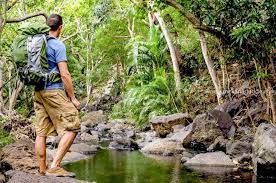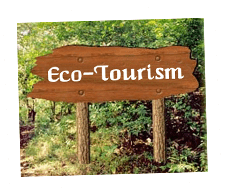Eco-tour
Courtesy : ecotourism-world.com/
Ecology, as the living state and structure of the environment. To combine ecology and tourism in a way which does no harm to the environment and allows for the traveler to learn about the environment is the act of ecotourism.
By observing and experiencing nature, we are able to learn about its functions and mechanisms. On eco-friendly trips that engage in activities that protect wildlife and the natural environment, preserve archeological sites and indigenous cultures, we have the opportunity to be active participants in preservation efforts.
There are three main pillars of the concept of ecotourism for sustainable tourism: Conservation of nature and culture, economic return of profits to local communities, and the learning experiences of the travellers. An eco-tour is a tour that turns these experiences into actions.
1. Contribute to environmental protection through eco-tours
Ecotours themselves include activities aimed at environmental protection (such as planting trees and maintaining trails, etc). Many tours direct all or part of the profit from the ecotours, into environmental protection efforts. Indirect contributions to environmental protection also exist in the form of admission fees to national parks and nature reserves, which are used to maintain, protect and improve and preserve the environment in the protected area.
2. Contribute to cultural preservation through ecotours
Visits to archeological sites, admission fees to cultural museums and taking culture tours, all contribute to cultural preservation.
Culture can be a delicate issue. Issues with regard to the relationship with indigenous peoples, such as the Aboriginal case of tourists climbing Ayers Rock, a sacred site for the Aborigines, or the Nordic Sami culture regarding tourism activities. Sometimes this can be challenging, because some tour companies can have doubts about the traditional costumes, traditional happenings or do not communicate well with the indigenous people. This is why it’s recommended to give consideration not only to the tour itself but also to the fact that the culture was properly communicated in the form desired by the indigenous people and to consider the indigenous people’s cultural activities. It is important to check the policies of the tour company in this regard.
3. Prevent extra damage to the environment and culture by being aware of and practicing the principles of ecotourism
Being aware, on the part of travellers, can help to prevent both environmental and cultural damage. Some examples of awareness are: not littering, using sunscreen which is deemed safe for the coral reefs, not approaching or touching animals, not giving unreasonable items to the local children, booking direct flights, travelling by foot / bike or using local transport to reduce emissions. There are many things that one has control of, which can make a difference.
4. Contribute to local communities through ecotours
One thing travellers should pay attention to is if the ecotour utilises the services of local companies and accomodations. Sustainable & ecotourism involves benefiting the local community. When payments are directed towards local tour / ranger guides and ecolodges, it is income for and employment of local residents.
5. You can eat delicious things that you can get locally on the eco tour
‘Local production for local consumption.’ This is a good phrase to remember and simply means to consume locally produced products, locally. Both food waste and CO2 emissions can be reduced by consuming only what is needed, and sourced locally. In addition to this, one is able to enjoy delicious meals made with locally grown ingredients, and maybe to even discover a new ingredient which one has never tried before!
6. You can learn more about the locals through eco-tours
When on an ecotour, there is high probability that one will be visiting a nature park or nature reserve with a local guide, such as a ranger. These rangers are experts in the local culture and the nature. They will certainly tell you much about the locals, the nature, the flora and fauna of the area. A days worth of learning will be of much higher value to you, than if you went around yourself and these stories went unsaid.
7. One can grow through the ecotour experience
Participating in an ecotour raises awareness about the environment. Acting as a trigger for thought, one may experience deep-thoughts on various issues, such as environmental issues and local socio-economic-political issues within the community. Through such awareness, one is able to reflect on one’s own growth.
8. Educate children through eco-tours
Families with children are able to benefit from ecotours. As children are more inclined to soak in their surroundings and retain the information more than most adults, ecotourism is an excellent source of information for them. Learning how to interact with the environment from childhood is valuable. Take the time to discuss the meaning and significance of environmental protections with your children, and the actions that they can take in daily life.
9. Influence others by reviewing ecotours
You don’t need 1million followers on instagram to be an influencer. Your thoughts and opinions matter! Many people do some internet research about their chosen destinations before making arrangements. By sharing your positive experiences online, as well as while chatting with friends, you can positively influence others. In the long term, the higher the number of people participating in ecotours, the higher the demand. As the tourism industry caters to high demand, this could help to transition the tourism industry into a more eco-friendly entity.
10. After doing good things for earth in the ecotour, it feels good!
It feels good to be on an environmentally friendly journey. The satisfaction that comes when making earth-friendly decisions, is good!
People sometimes think that their individual actions do not have an affect on the larger issue. However, you must remind yourself that these actions accumulate. Many small actions, make bigger actions. Oftentimes we do not even realise the effect our daily choices have on the whole. There are many millions of tourists every year. Think about the effect it will have if even half of those make small, more environmentally aware tourism decisions. “Many a little makes a mickle” meaning that even though it is a small thing, when it accumulates, the impact will be bigger.
One thing to note is that despite the name Eco Tour, there are regular tours that exist which are not really ecotours. Unfortunately, some tourism operators ‘greenwash’ their options to appeal to the sustainable market. These are usually just a tour that looks good which includes the name ‘eco’. In order to avoid these greenwashing tactics and make informed decisions, these are the 3 things that will make it an ecotour:
- Conservation of nature and culture
- Economic return of profits to local communities
- Provides a learning experience for the travellers
It is very important to check the contents and motivation of the tours, and to ask questions if the information is not readily available. If you are unsure, you may prefer to select an ecotourism certified organisation, company or service.





